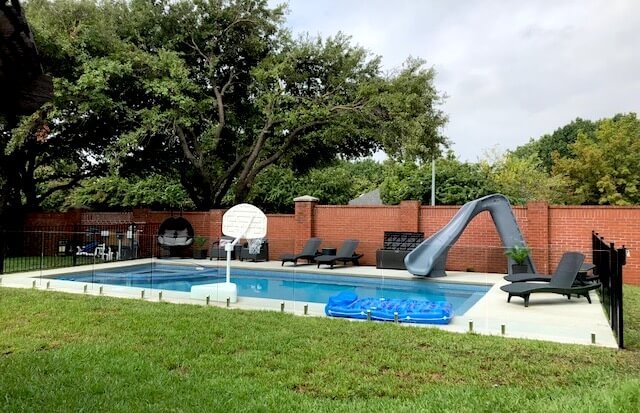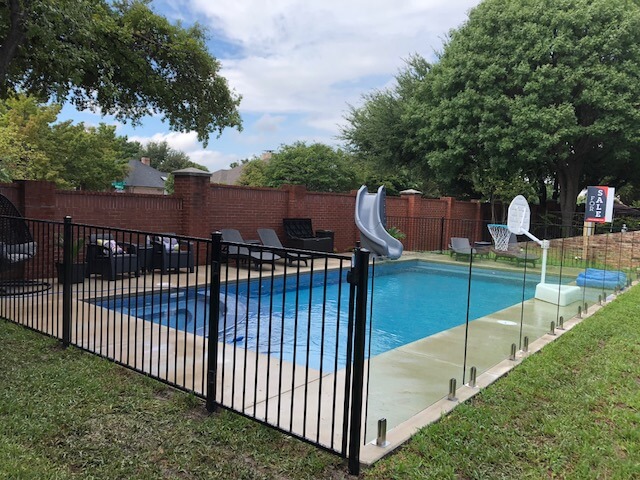
How Do Glass Fences Compare to Traditional Fences?
Fences are a common feature of nearly every backyard, whether used as a swimming pool safety barrier, property line fence, or patio enclosure. There are many fencing options available to homeowners today. The most common materials used for fences includes wood, mesh, metal, glass, and plexiglass. All have different advantages, installation processes, and lifespan.
Safety is of utmost importance when considering design for our homes, followed closely by aesthetics. Frameless glass fencing is an innovative new product that seems to provide the best of both worlds. Keeping uninvited guests out and our children and pets safe can be achieved with most types of fencing. However, having a crystal clear view through that barrier is only achievable with a glass fence.
Curious how glass fences stack up against traditional fences? Read on to learn the pros and cons of each fencing type.
Glass Fences
Glass fences have been growing in popularity over the last decade because they offer the aesthetic, durability, and low-maintenance that property owners are looking for. One of the major draws is the sleek appearance, which opens up any space and makes it appear larger than it is. The glass fence panels are made of tempered safety glass, which is six times stronger than regular float glass and strengthened to be scratch resistant. Because they are installed with marine-grade stainless steel hardware there is no risk of corrosion. Maintenance consists of a wipe down with soapy water every 8 weeks. While glass fencing is certainly more costly than mesh or chain-link, it is sure to outlast the cheaper options and look great while doing so. Glass fences last longer than any other fencing system available.
Wood Fences
Wood fences are one of the most common types of property line fencing. Wood is one of the most natural looking elements to provide a barrier for your home. Wood fences can be very charming aesthetically and depending on the design, usually low in cost. On the downside they are highly susceptible to rot and wear and tear. Pests love to nibble on these rustic barriers and water is not friendly when it comes to this material.
Mesh Fences
Mesh fences are the least expensive and quickest to install, making them a good option for temporary or removable barriers. However, don’t expect them to be an incredibly strong barrier for keeping things in or out. They are not known for their durability or visual appeal. Low quality aluminum posts are prone to breakage, and the mesh panels are not tension resistant. The fence may require frequent adjustment or replacement if people lean on or fall into the fence. Mesh fences should only be used when time and budget are tight, or when a removable fence is desired. It is not the best type for a permanent solution.
Metal Fences
Metal fences are typically a better option than the last two mentioned due to their durability. When choosing a metal fence the buyer has a wider range of options to choose from, depending on their budget and needs. Chain-link metal fences are the least in price in the metal fence category and are fairly easy to install. You will have to consider with this low cost you won’t receive the highest durability and it definitely has a utilitarian appearance as opposed to other options. If you want something more durable you can go with a wrought iron metal fence. This is a much more expensive option but also longer lasting and more visually appealing. This fencing will be susceptible to corrosion and will require frequent upkeep to maintain it. They are heavy and require a skilled installer, but if maintained will last longer and provide a much better aesthetic than chain-link.
Plexiglass
Plexiglass is a less expensive alternative to tempered glass that offers a similar appearance. Its beauty unfortunately does not last long, as plexiglass cannot handle the inevitable weathering of the outdoors. It is not scratch resistant and will become cloudy and discolored after only one year of exposure to salt in the air, UV rays, and chlorinated water. When investing in your home it is always worth it to spend the extra money on quality to save in the long run and save yourself from the hassle of having to install and reinstall multiple systems due to lack of longevity.


